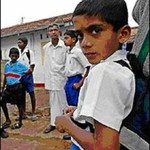By Peter Dobbie
 Galle - Question: When does education become welfare? Answer: When you are 10 years old and have lost almost everything you possess to an act of nature you cannot possibly comprehend.
Galle - Question: When does education become welfare? Answer: When you are 10 years old and have lost almost everything you possess to an act of nature you cannot possibly comprehend. I met Thirindra at the Sudarma school on the day of class registration - two weeks and one day since the tsunami hit.
He was one of 628 pupils who had turned up for the most mundane of educational necessities, apparently showing that, despite his youth, he was here, he was alive and ready to return to normal.
This tall young boy, with his quiet disposition and his bag of cooked rice and sweet-corn, displayed nothing more than curiosity in the noise and the rubble: What was that white van with Unicef plastered down one side doing in his school playground? Why were there huge US marine earth-movers bulldozing and munching their way through what had been his school office?
And what was this thing that had taken his mother and his sister?
Thirindra will have the answers to those questions in time. Not yet perhaps, not in weeks or months, but in years.
The answers Thirindra seeks will come not from psychologists who are here in numbers from all over the world, nor from the United Nations counsellors who are here too.
They will come from within, drawn out by his teachers.
'Possessing' the disaster
The local education board has already identified what has to be done for children like Thirindra. It is simple - they must talk.
In their almost derelict factory of education, they must discuss what happened.
Here, on the edge of Main Street, Galle, cocooned by the smell of burning rubble and toxic rubbish, the children will discuss.
They will draw pictures of cars, houses and people being swept away, never to be seen again.
They will worship in the multi-faith convents, where Buddha, Allah, Christ all offer something.
They must, and this is one area where local education planning managers and Unicef agree, "possess" this disaster.
The people of Galle do not actually need the UN to tell them that the best way for children like Thirindra to cope is through talking.
Yes, he may need the UN's $60 "school-in-a-box", he may also need clothing and food donated by people thousands of miles away whom he will never know or understand.
What he does not need are our Western ideas of psycho-babble, imposed on him at our timetable.
Salvation from school
He can and will reach some sort of understanding through the process of talking or writing or drawing with his friends and teachers.
They, after all, have to reconcile day-to-day life with the facts of a new existence: Two or three pupils per class will not be coming back.
There is an expression one hears in Sri Lanka: "What to do, what to do".
This is a fatalistic prompt into accepting that there are times when life deals you such a blow that all you can do is accept it and move on.
Sri Lankans do not believe in self-pity. Dust yourself down, get up and keep on going - that is the logic here.
In a country where large extended families look after each other, and the people of Galle began their own clean-up and rebuilding unaided by anyone, that ability to accept what has happened may yet prove invaluable.
For children like Thirindra, that attitude - combined with the structure of something as simple as the school day - may just be salvation enough. I hope so.



